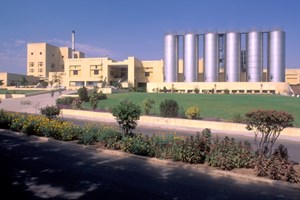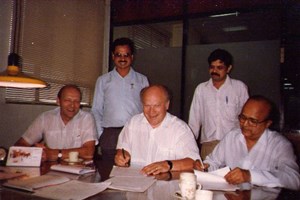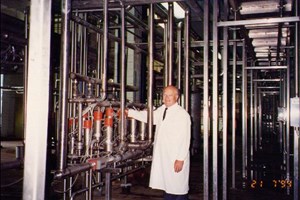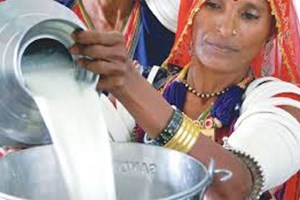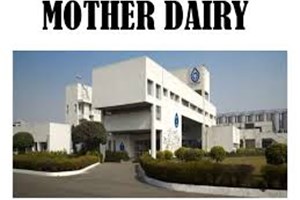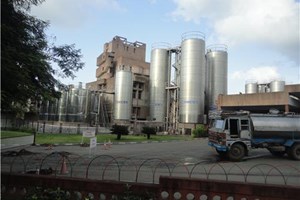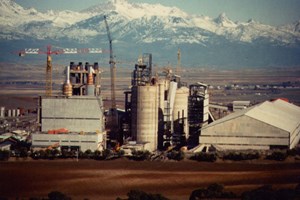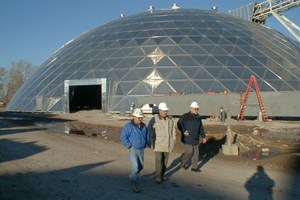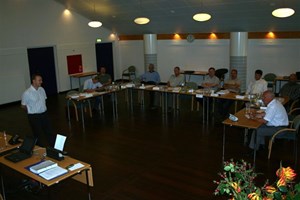
Failed Industrial Projects
Most
Industrial Projects are fortunately mostly successful in terms of their
implementation, technical and commercial performance, product compliance, timing
and financial result according to the investment budget and forecasted yearly operational
result.
Probably 5
– 10 percent of the Industrial Projects are failures to a substantial degree
due to one or several of the following failure factors:
A. Significant delays of implementation
completion
B. Failures of applied technologies and
key process equipment
C. Lack of technical overview expertise
to secure the right production flow and especially the critical controlling of processes
and key equipment´s performance
D. Investment cost budget overrun of
30% or more
E. Local conditions appears to be much
different and insufficient as not expected
F. Owners (partners) had to separate due
to major disagreements; same as for suppliers and subcontractors
G. Non-performance of suppliers and
subcontractors
H. Market conditions change
substantially from the front-end estimate to start production
I.
Failure
design, steel structures, foundations, buildings & installation incl.
pre-commissioning
J.
Insufficient
Plant Management, staff & workers incl. training
K. Insufficient Overall Project
Management and Construction Site Management
L. Insufficient contracting structure,
procedures and regarding sub-suppliers & -contractors
A substantial
number of middle seize Industrial Projects typically has implementation times
of 1 – 4 years, an investment budget of 5 – 70 million € and the success of
such project depends on the success (or failure) factors of all the 3 project
stages – mentioned below:
1. Project development, - description,
feasibility study, budgets, tender documents & call´s, selection of
qualified and attractive bidders, contract negotiation & -signature &
-effective
· Failure factor 1: Early &
comprehensive risk assessment and action plan not performed
· Failuer factor 2: Unrealistic estimation
based on similar spec´s & prices excl. reserves
· Failure factor 3: Unrealistic design
based on Owner´s spec.
· Failure factor 4: Unrealistic time
schedule excl. reserves unforeseen obstacles in- or externally
· Failure factor 5: Effective
Contracts on the basis of main equipment had not been double checked by
Contractor and not cleared by the Owner again!!!
2. Project design, design meetings and
approval. Detailed design and major equipment ordering, manufacturing, shipping
and registration / storing on site. Training of Owner´s staff:
· Failure factor 6: None early &
comprehensive detailed design to be complete early without mistakes
· Failure factor 7: Owner´s active control
of detailed design not completed at Design Meetings
· Failure factor 8: No systematic ordering of equipment & regular inspections of production progress and quality; basic & real maintenance, operational PC supported training
3. Buildings / foundations, installation
incl. pre-commissioning, performance tests and acceptance certificate and
warranty period:
· Failure factor 9: Buildings /
foundations, installation and pre-commissioning might be completed with
mistakes & late
· Failure factor 10: Unsystematic commissioning
for fault-finding and process optimization
· Failure factor 11: Testing long-term stable production quantity and quality as condition for performance tests not based on longer production
4. Plant operation under normal
condition. Performance testing. Training continue:
· Failure factor 12: Performance
testing results not in accordance with the Contract.
· Failure factor 13: Acceptance
certificate not yet signed by Owner and Main Contractor
· Failure factor 14: No clearance of punch list and other outstanding issues. Start warranty
Critical
factors in order to avoid failed industrial projects:
·
Check
and adjust the roles of the Owner (checking, controlling & approving or
rejecting) and of the Main Contractor (proposing action plans, solutions and
carrying them out); informing the Owner of the progress and of critical activities
ahead!
·
Planning
and early preparations at all stages starting with the Master Project Plan and accordingly
detailed plans for each stage
·
Systematic
recruitment of right key staff for the development & implementation phases
·
Strong
support from Senior Managements of the Owner and of the Main Contractor
· Establish friendly and constructive relations to Owner and other contractors and suppliers and subsequent procedures as required
Failed
Project Cases:
· Case 1: Fertilizer Plant: Owner extremely tough re. specs approvals. Project rather complicated and Contractor somewhat a newcomer, this project was very big turnkey with new technology as nominated sub process plant designer, supplier, installer and commissioner in a remote and hostile region and government. Owner extremely tough re. pre-commissioning checkouts approvals. Major delay! Massive budget overruns of approx. 100% of Contract original Value!
· Case 2: Building Materials Plant: Turn-key Main Contractor of proven technology in a remote and hostile region and government. Problems with Civil & Building Subcontractor re. design, drawings and work progress & quality. Delay approx. 25% and 35 % budget overrun. When the plant was completed it produced 120% capacity from day one and was considered very successfully by the Owner. Owner signed technical assistance & training contract. Several other similar plants was ordered by Owner and operated efficiently in the same country!
·
Case
3: Food processing plant extension / capacity upgrade (while in commercial
operation) proven technology, process plant designer, supplier, installer and
commissioner on an Island State near a major market. One of key equipment was a
critical completely new development and not properly tested design. That
failure reduced the production significantly in high season for the drinking
product. It lasted approximately 1 month before the supplier could install the
re-designed equipment. The Project Manager
and his Director decided to provide all possible assistance to continue the
production as near to full capacity as possible (60%) by “working like hell”,
which the Owner appreciated and he applied no penalties or damages.
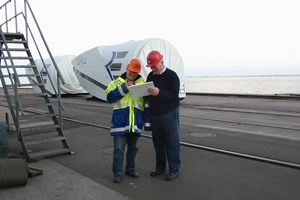
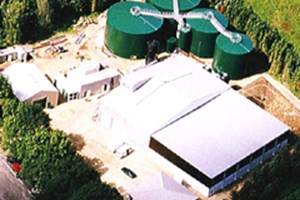
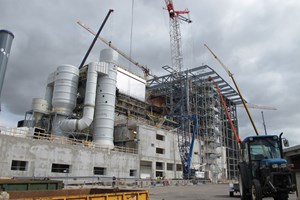
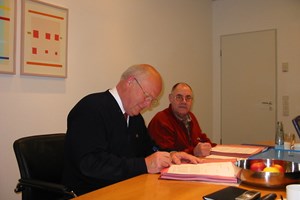
Project
Business is risky, complicated hard work and hopefully profitable.
International Project Business is about winning
the right project orders that fits the competencies of the Designer, Supplier
& Contractor (jointly named Contractor) and it is all about how to make reasonable
profit of the project considering the risk?
The good & solid basis for Contractor´s future
profit, at the end of the project implementation, must be created by the
Contractor at the very early stages of the project! Often project staff think
that what causes problems are the handling of external factors. In our
experience, the internal factors of the Owner´s & Contractor´s operation
are the most critical and decisive for the project result! The Contractor´s best
control of such factors are the responsibility of the Senior Management and of
the Project Manager!
To appreciate
the mechanisms of project development and implementation the parties and their staff
must understand the project phases and the roles of the parties:
·
Identification
of project Owner & project options, project development and contract
negotiations. Project organization. Local Authorities´ approvals and permitting
·
Basic
project design and estimation, risk assessment and basis for contract drafting
·
Project
cost prices & profit and time schedule estimation
·
Contract
drafting and negotiations of main parties. Agreed and Signed Contract
·
Project
implementation hand-over, check of final design and Effective Contract
·
Design
plant, processes, systems & equipment plus design meetings & Owner´s
approval
·
Detailed
civil & building design; foundations-, structuring- & building works
incl. inspections
·
Equipment
installation and pre-commissioning check out and approvals
·
Plant
and equipment commissioning to check the equipment / automation to optimize
·
Punch
list clearance, performance testing, acceptance, final accounts start of Warranty
The Project Implementation
often require the following professional disciplines to be involved:
We will now
turn back to the project development business (i.e. project marketing and
proposals selling) activities that are securing the right project orders, at
the right prices & terms, with the right proven technology & plant
conditions, on the right time schedule and with the right leadership, crew,
local conditions and a reasonable Owner!
The
activities of Project Sales & Development are the keys for making the above
“success dreams” coming through! The specific order intake is not realized
before the Contract is drafted, agreed and enforced (effective contract) and
handed over from Project Sales to Project Implementation i.e. the designated
Project Implementation Manager (PM).
Another earlier
& realistic case is a project development situation, where the PM shows
interest to assist the Sales Manager already in the beginning of the sales and
development phase and both of them can see the advantage in their cooperation
already in the beginning of this phase.
PM might be
interested in the following activities:
A. Scope of work & equipment &Risk
assessment
B. Time schedule &Project
estimation & budget
C. Project staffing &local offices
required &Contract assessments. Board & Lodging & Welfare
D. Local Authorities & Permits
& Local taxes and duties & Shipping and local transport
E. Site facilities and safe storage of
equipment & Project Owner´s key staff and contact information
Conclusion:
The Project Sales & Development
Manager and the designated Project implementation Manager (PM) must cooperate
to get the project planned and prepared at the right time!
A. The right people with right
attitudes, high ambitions and safe competencies as required by project
development and project implementation on time, on spec. and on budget
B. The right company leadership and the
effective project organization and especially the project management
C. The technologies, processes,
equipment, quality assurance as required for the projects
D. Focus on proven technology solutions
that works with only few & smaller failures to be corrected and reported.
Reporting and actions on all deviations, non-compliance and failures or
potential failures
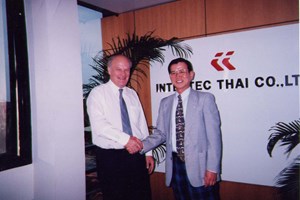
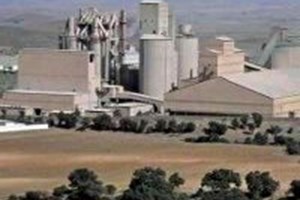
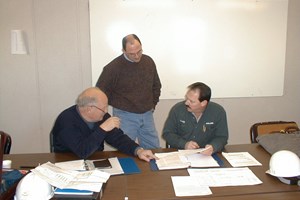
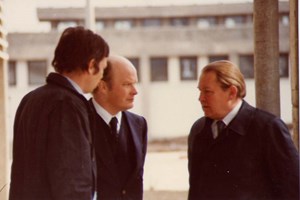
The Russian Project Experience amidst major turmoil!
The Russian Federation (RF) decided in 1989 (in the last days of the Soviet Union) to establish a major modern ice cream factory in Moscow - with a capacity of 30 million liters yearly output - in order to supply first class ice crème to the Russian consumers, who loves ice cream the whole year around! In order to apply modern technology and quality control RF decided to enter into a Joint Venture (JV) with the respected USA first class ice cream producer, distributer and ice cream parlors (restaurants) operating worldwide as their partner. The new Russian plant was named Baskin Robbins Production International (BRPI) and would be build and operated by the JV as the project Owner. Distribution and Sales were separate activities but related to BRPI.
Early on BRPI had contacts to APV in London (Head Office), Aarhus DK , Chicago and Moscow, where APV had offices. The main Project Center was APV Danish Turnkey Dairies (APV DTD) in Denmark (DK), specialists in turnkey dairies, milk powder plants & breweries, who provided project proposals and feasibility studies to the JV for their acceptance. The concept was based on US financing of the entire project to be transferred to western companies against their design, equipment, buildings and installation / commissioning etc. and managed by APV DTD´s Project Management (PM).
In 1990 the JV issued a letter of intent to APV DTD and later issued orders for design, equipment, building and installation / commissioning. But one factor was changed by the JV, who required the building by a Russian Building Contractor (RBC) to be paid in Rubles, due to shortages of US $ as the project costs increased. The APV DTD PM urgently had to investigate the Moscow market for professional & trusted building contractors in the middle of the major restructuring in Russia. The selection criteria was to demonstrate the RBC´s professional work already performed at other inspected site and his ability to produce a realistic budget plus references from other major building constructions in the past. Only one RBC could live up to those very basic requirements. The PM only had one candidate to appoint as the Building Contractor and to sign the contract with the JV, but daily managed by the responsible PM. That the JV hesitated, but PM strongly recommended and then JV accepted. The PM needed the JV´s backing to in order to lead the project implementation with JV back-up in case of serious problems!
The Russian Building Contractor performed reasonably well according to local standards, but at the end of the construction, the final work and punch list points to be cleared then dragged out. The PM then used his secret weapon of calling for the intervention of the JV i.e. the Russian JV MD, with very good connections with the Moscow elite. At an ordinary project meeting, the JV MD instructed the MD of RBC to speed up dramatically with a much more effective, stable and professional site management and manpower. If not he might face very serious consequences! Then the final building completion progress was speeded up, soon completed and accepted in 1995 when production started the plant was inaugurated.
Since then ice cream factory plant has produced high quality ice cream and slowly increased the sales. The plant has performed very well and the cleaning & maintenance is at level with the best international standards, which I can confirm from my visit in June 2008 when I spend two days at the plant. I met with and discussed the plant and the business with the staff, whom I knew from project work and training at Svendborg Technical College, Denmark.
The Russians are brave and great people!
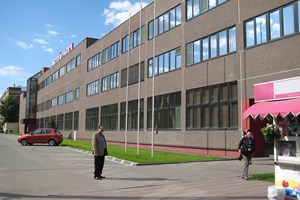
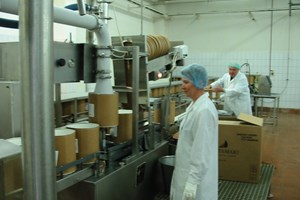
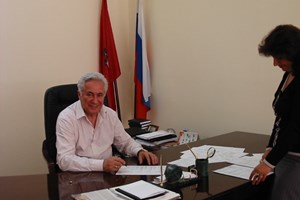
How India became the world´s biggest dairy producer. The nutritional breakthrough of the Dairy Industry following Indian independence 1947
1.
Independence 1947 and milk powder
import was subsidized by European Union supported by the World Bank. India
& Pakistan had severe problems of separation and relocation of millions of
people under ferocities. The main elements are the Anand dairy pattern at Amul,
Gujerat in India and the national milk grid linking produces throughout India
with consumers in 700 towns and cities!
2.
Operation Flood - World bank supported
program
2.0
Operation Flood was launched in 1970
by the Indian Government and it is implemented successfully by National Dairy
Development Board headed by Dr. V. Kurien as the worlds most ambitious dairy
program and made India the biggest milk producer of the world.
2.1
Phase 1:1970 – 1980: Establishment of
the new Indian National Dairy program, to be managed by National Dairy
Development Board, the first modern dairy plants in India based on 18
milk-sheds (milk collecting areas and centrals). Larsen & Toubro Ltd.
Bombay & De Danske Mejeriers Maskinfabrik, Kolding & Pasilac, Silkeborg
jointly supplied dairy processing equipment and plants to India already from
independence. Total Indian Milk intake per year increased from very little to
33 Million tons/y. Indian total population: From 554 mil. Inhabitants to 697
mil.
2.2
Phase 2: 1981 – 1985: Establishment
of the program, further development of National Dairy Development Board
including World Bank loans on favorable terms, the major modern dairy plants in
India based on 136 milk-sheds (milk collecting areas and centrals). Total
Indian Milk intake per year: approx. 70.000.000t/y of which 12-15% was
processed. Products: Milk drinks, Sour Milk, Sweetened Condensed Milk, Ice
Cream with different flavors, Butter Milk, Milk Powder etc. etc. Indian total
population: From 714 mil. Inhabitants to 782 mil.
2.3
Phase 3:1986 – 1996: Establishment of
the program, further development of National Dairy Development Board including
World Bank loans on favorable terms, the major modern dairy plants in India
based on 136 milk-sheds (milk collecting areas and centrals).Total Indian Milk
intake per year: Cow milk 61 mil Tons/y & Buffalo milk 70 mil. Tons/y . Passing
USA production and the World´s biggest milk producer. Indian total population:
979 mil. Now increased to 1.327 mil. Inhabitants in 2015
3.
World Bank tendering for the new
mega, modern & automatized milk processing and powder plant Mother Dairy of
Gandhinagar (Master Dairy Plant as the Indian Model) was issued in 1992
(Gandhinagar is the Capital of the Indian northwesterly placed province Gujarat
with a population of approx. 90 million inhabitants – to be checked). This
tender had also been published in the late 80´ties, but withdrawn due to local
conditions. The main bidders were Alfa Laval´s Indian Subsidiary in Pune and a “consortium”
consisting of Indian conglomerate Larsen & Toubro Ltd., Mumbai together
with project management and technology suppliers APV Danish Turn Key Dairies
Ltd., Niro Atomizer both from Denmark and Westphalia Seperator from Germany.
The basic WB & NDDB requirements were a raw milk intake of 1400.000 for
milk in pouches and 600.000 l/d for Skim Milk powder plus an substantial milk
powder production
4.
World Bank tender conditions,
technical specifications and terms of contract including NDDB requirements. All
terms and conditions to be fulfilled and special features of the proposed plant
processes and equipment etc. to be specified and followed strictly so that
Tender Committee of WB & NDDB could select the best priced bid on the same specifications,
terms and conditions. Bid presentations and clarification meetings between WB
& NDDB and (separately) with the bidders were held. On the last one, the WB
Senior Expert (WBSE) mentioned to the leader of the “consortium”, that another
bidder had stipulated & promised a project implementation time schedule of
22 month, whereas the “consortium” has stipulated 26 month. The question was
whether the “consortium” could match the 22 month bid? The leader of the
consortium told the WBSE, that he believed that his 26 month schedule was much
more realistic than the other bid, having Indian construction work progress in
mind! Afterwards the WBSE issued a correction to the Tender Documents that the
time schedule was be frozen to 26 month! The “as build schedule” was for
various reasons somewhat longer due to local conditions. No delay penalties
were claimed by NDDB! The Mother Dairy Gandhinagar performed excellently after
completion and commissioning and it is a model for modern automated Production
Plants in India and other countries!
